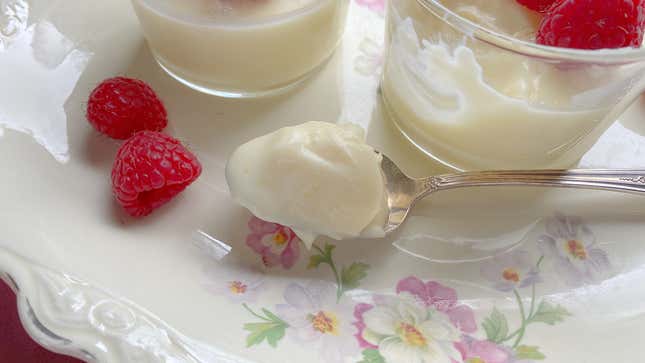If you saw “lemon curdled cream” listed on a dessert menu, you’d probably pass over it in favor of lava cake. Understandably: “Curdled” is an inherently unsexy word. But while not all curdling is desirable, there are many instances in which curdled dairy is a good thing. Cheese is a big one. This sweet, creamy, four-ingredient lemon posset is another.
Posset has been around forever. Lady MacBeth even used poisoned possets to incapacitate the guards outside Duncan’s room, but the dessert looked a little different in Shakespearean times. Instead of a cold set creamy dessert, the original posset was a hot, spiced drink made of milk curdled with wine or ale.
The modern iteration is served chilled and curdled with lemon juice, but the science is the same: Milk and cream contain a protein called casein. This molecule has a negative charge that repels other casein molecules, allowing the proteins to float around without clumping. When you add an acidic ingredient, such as wine or lemon juice, you introduce positively charged protons (hydrogen ions) into the solution, neutralizing the negative charge on the proteins and allowing them to amass and form curds.
And that’s really all there is to making posset. You boil some heavy cream with sugar, then add lemon juice and let it sit until tiny curds form, resulting in a tangy, sweet dessert with a texture similar to crème brûlée. It is delightful—almost like key lime pie filling, if key lime pie was flavored with lemons, or a soft lemon pudding made without corn starch, flour, eggs, gelatin, or any other thickening agents.
There are lots of recipes for lemon posset—they’ve been perfecting it since Shakespearean times, after all—but I based my own off of this one from Food52, as it was one of the more streamlined (lazy) recipes I found. Some posset recipes call for zesting the fruit or making a syrup, and I didn’t want to do any of that.
I did, however, want to get a little bit of tangerine juice involved before citrus season completely wraps up. So I used 1/4 cup of lemon juice and 2 tablespoons of tangerine juice, rather that 5 tablespoons of pure lemon juice as suggested by Food52. (Feel free to play around by substituting in various citrus juices. You could even use key limes.)
This recipe is easy to execute, but you do have to pay attention to the cream. It’s not uncommon to find globs of butterfat floating around in heavy cream, and you want to make sure you strain those out. If you leave them in and heat them along with the rest of the cream, the fat will melt and then solidify on top of your posset, creating a thin, greasy film. It’s not the end of the world, but it will be noticeable. You’ll also want to keep an eye on the cream the entire time it is boiling, as dairy can boil over quickly.

Other than that, the only thing you have to worry about is finishing your posset. Fresh raspberries pair well with lemon, but you could also add a dollop of raspberry jam, some unsweetened whip cream, or a shortbread cookie for dipping. You could even brûlée it if you like, though you will need a torch (or reliable broiler) for that.
Lemon and Tangerine Posset
Table of Contents
Ingredients:
- 2 cups heavy cream
- 2/3 cup sugar
- 1/4 cup fresh lemon juice
- 2 tablespoons fresh tangerine juice
Measure out the cream, making sure to strain away any clumps of butter fat. Add the cream to a small sauce pan with the sugar, then bring to a boil over medium heat, watching constantly and stirring to melt the sugar. Let boil for five minutes, then remove from the heat and stir in the juice.
Let the mixture cool for 15 minutes, then divide amongst four ramekins, or tea cups, or these little bodega glasses (which is what I did). Chill in the fridge for at least two hours, and serve cold with whatever finishing touches you desire.
